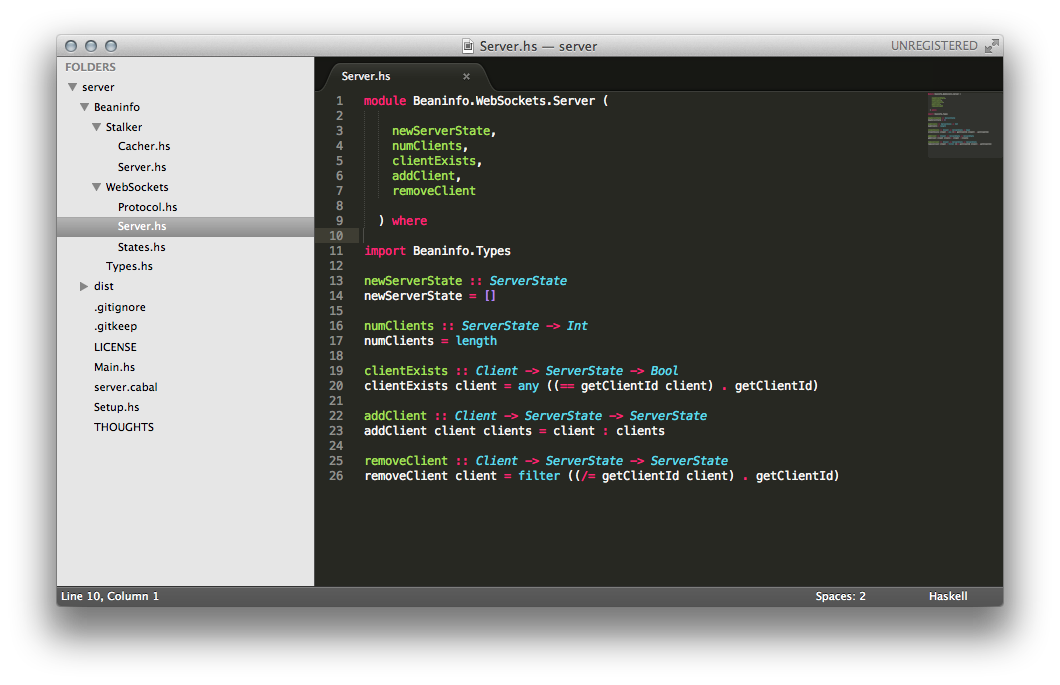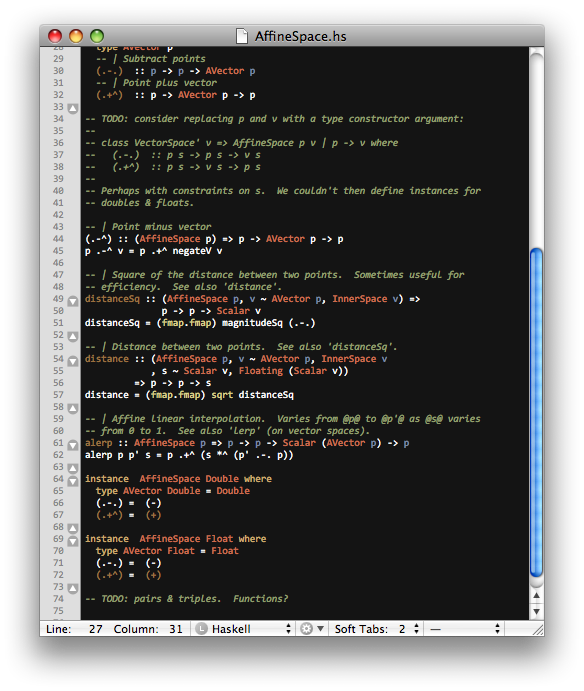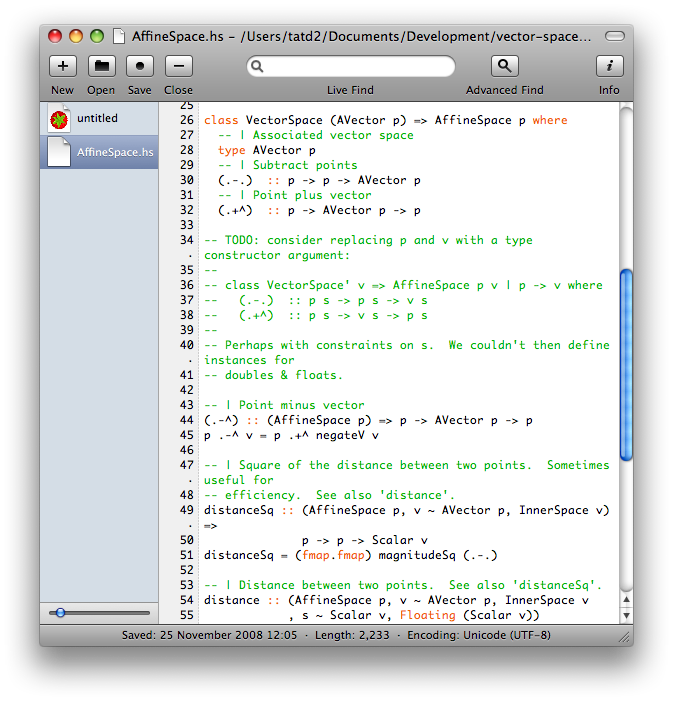Difference between revisions of "Mac OS X"
DonStewart (talk | contribs) |
|||
| (71 intermediate revisions by 23 users not shown) | |||
| Line 1: | Line 1: | ||
| + | There is also now the [[Mac OS X Strike Force]] that aims to improve using Haskell on OS X. |
||
| − | * [http://haskell.org/ghc/download_ghc_6_10_1.html#binaries Download GHC for Mac OS X] |
||
| + | == The Haskell Platform == |
||
| + | There are Mac OS X installers of the full Haskell Platform development environment. We recommend it: |
||
| − | == HUGS on Mac OS X == |
||
| + | [http://haskell.org/platform/ http://haskell.org/platform/icons/button-100.png] |
||
| − | There is a [[Fink]] package for Hugs. |
||
| + | == GHC == |
||
| − | == GHC 6.4.1 on Mac OS X 10.3.9 (Panther) for PowerPC (PPC) == |
||
| + | ==== Important notes ==== |
||
| + | To get the most out of your GHC environment, you should add '~/Library/Haskell/bin' to your PATH environment variable before the path where you have GHC installed. This will allow you to get and use cabal-updates, as well as other programs shipped with GHC like hsc2hs. |
||
| − | Haskell requires a newer version of XCode than the one distributed with Mac OS X 10.3 (Panther), this version of XCode only works on Mac OS X 10.4 and upwards. Currently there is no way to compile GHC on Mac OS X 10.3.9. |
||
| + | In your ~/.profile, add the line: |
||
| − | Then go get the GHC binary for OSX here http://www.haskell.org/ghc/dist/6.4.1/MacOSX/GHC-6.4.1.pkg.zip |
||
| + | <code>export PATH=$HOME/Library/Haskell/bin:$PATH</code> |
||
| − | Unpack the zip file & install the binary |
||
| + | === Mac OS X 10.9 (Mavericks), Mac OS X 10.8 (Mountain Lion) and Xcode 5 === |
||
| − | GHC should be able to compile .hs files without any trouble. |
||
| + | Both Mountain Lion and Mavericks support and now use XCode 5, which no longer provides GCC, only Clang. |
||
| − | === Other notes: === |
||
| − | This should |
+ | This should not be problem for GHC 7.8 and newer, but |
| + | If using GHC 7.6.* or older, one of several work arounds is needed! |
||
| + | The workaround that the Haskell Platform maintainers are supporting can be found [http://www.haskell.org/pipermail/haskell-cafe/2013-October/111174.html here]. That work around along with [http://justtesting.org/post/64947952690/the-glasgow-haskell-compiler-ghc-on-os-x-10-9 this one] work with only the system provided compilers. |
||
| − | The errors I recieved when trying to compile with only the distributed verison of XCode were like this: |
||
| − | /tmp/ghc18985.s:232:Unknown pseudo-op: .subsections_via_symbols |
||
| + | However, if you are still encountering usual bugs, the GCC based directions [https://gist.github.com/cartazio/7131371 here] may work out better. |
||
| − | == Intel Macs == |
||
| + | === Mac OS X 10.5 (Leopard) === |
||
| − | The GHC 6.6 binaries work just fine on Intel Macs. MacPorts also supports it now. |
||
| + | To install GHC on Mac OS X 10.5 (Leopard), there are the following options: |
||
| − | * http://hackage.haskell.org/trac/ghc/wiki/X86OSXGhc |
||
| + | * install the [http://hackage.haskell.org/platform/ Haskell Platform] |
||
| + | * install [http://www.macports.org MacPort]'s [http://trac.macports.org/browser/trunk/dports/lang/ghc/Portfile ghc] package |
||
| + | === Mac OS X 10.6 (Snow Leopard) and 10.7 (Lion) === |
||
| + | |||
| + | * Install the [http://hackage.haskell.org/platform/ Haskell Platform] |
||
| + | |||
| + | To uninstall ghc call: |
||
| + | <code> |
||
| + | sudo uninstall-hs |
||
| + | </code> |
||
| + | |||
| + | === Xcode 4.1 === |
||
| + | |||
| + | GHC needs Xcode to be installed so it has access to the bintools, headers, and link libraries of the platform. The later two are provided by the SDK that comes as part of Xcode. GHC 7.0.2 is compiled against the 10.5 SDK. Xcode 4.1 no longer ships with it. <tt>ghci</tt> will work, but linking and some compiles with <ghc> will not. To make those work you need a copy of the 10.5 SDK. You can get this one several ways: |
||
| + | |||
| + | * Before you install Xcode 4.1, if you have Xcode 3.2 installed, do one of the following: |
||
| + | ** Move it aside (renaming <tt>/Developer</tt> to <tt>/Xcode3.2</tt>) |
||
| + | ** Move just the sdk aside (moving <tt>/Developer/SDKs/MacOSX10.5.sdk</tt> to, say, <tt>/ExtraSDKs/MacOSX10.5.sdk</tt>) |
||
| + | ** Move just the sdk aside, install Xcode 4.1, then move it back into the <tt>/Developer/SDKs</tt> directory. |
||
| + | * If you don't have Xcode 3.2, then you can download it from the Apple Developer site, and install it in a location other than "/Developer". If you have already installed Xcode 4.1 ''be sure'' that you customized the install and don't install the "System Tools" or "UNIX Development" packages. |
||
| + | |||
| + | Building via GHC: |
||
| + | ghc --make -I{loc}/MacOSX10.5.sdk/usr/include/ -L{loc}/MacOSX10.5.sdk/usr/lib |
||
| + | |||
| + | Building via cabal: |
||
| + | cabal --extra-include-dirs={loc}/MacOSX10.5.sdk/usr/include/ --extra-lib-dirs={loc}/MacOSX10.5.sdk/usr/lib |
||
| + | |||
| + | Replace <tt>{loc}</tt> with wherever you put the SDK. |
||
| + | |||
| + | == HUGS == |
||
| + | |||
| + | * install [http://www.macports.org MacPort]'s [http://trac.macports.org/browser/trunk/dports/lang/hugs98/Portfile hugs98] package. |
||
| + | |||
| + | |||
| + | == Installing libraries with external C bindings == |
||
| + | |||
| + | Haskell libraries are installed with the <code>cabal</code> command line tool. |
||
| + | |||
| + | Some libraries depend on external C libraries, which are best installed with [http://macports.org MacPorts]. However, you have to tell cabal to include the <code>/opt/local/</code> directories when searching for external libraries. The following shell script does that by wrapping the <code>cabal</code> utility |
||
| + | |||
| + | > cat cabal-macports |
||
| + | #!/bin/bash |
||
| + | export CPPFLAGS=-I/opt/local/include |
||
| + | export LDFLAGS=-L/opt/local/lib |
||
| + | cabal $@ --extra-include-dirs=/opt/local/include \ |
||
| + | --extra-lib-dirs=/opt/local/lib |
||
| + | |||
| + | > cabal-macports install foobar |
||
| + | |||
| + | == Editors with Haskell support == |
||
| + | |||
| + | === Open Source === |
||
| + | |||
| + | * [http://aquamacs.org/ AquaMacs] or [http://emacsforosx.com EmacsForOSX], a graphical Emacs version |
||
| + | * [http://eclipsefp.sourceforge.net/ Eclipse] with the [[EclipseFP]] plugin. See [[EclipseOn_Mac_OS_X]] |
||
| + | * [http://www.gnu.org/software/emacs/ Emacs], is installed on every Mac |
||
| + | * [http://leksah.org/ Leksah] |
||
| + | * [http://code.google.com/p/macvim/ MacVim], a graphical Vim version |
||
| + | * [https://github.com/textmate/textmate Textmate 2], open source incarnation of TextMate 1. |
||
| + | * [http://www.vim.org/ Vim], is installed on every Mac |
||
| + | * [http://haskell.org/haskellwiki/Yi Yi] (written in Haskell itself!), is available through cabal-install |
||
| + | |||
| + | === Commercial === |
||
| + | |||
| + | [http://www.codingmonkeys.de/subethaedit/ SubEthaEdit]: |
||
| + | |||
| + | [[Image:SubEthaEdit.png]] |
||
| + | |||
| + | [http://macromates.com/ TextMate]: |
||
| + | |||
| + | [[Image:TextMate.png]] |
||
| + | |||
| + | [http://tuppis.com/smultron/ Smultron]: |
||
| + | |||
| + | [[Image:Smultron.png]] |
||
| + | |||
| + | and [http://www.sublimetext.com/ Sublime Text 2]: |
||
| + | [[Image:SubilmeText2.png]] |
||
| + | |||
| + | TextEdit is Mac's default text editor, a very basic editor that works fine for most uses, you must however be careful to put it into plain text mode using the Format menu. |
||
| + | |||
| + | == Shipping Installable Haskell Applications == |
||
| + | |||
| + | * [http://hackage.haskell.org/cgi-bin/hackage-scripts/package/mkbndl mkbndl] builds installable Mac OSX applications from your Haskell project. |
||
| + | |||
| + | == Links == |
||
| + | * [[Using Haskell in an Xcode Cocoa project]]; a description of how to add a Haskell module (callable from C) to an Xcode/Cocoa/Interface builder project on your Mac. |
||
| + | * [[Mac OS X Common Installation Paths]]: an effort to standardize where things go on a Mac OS X installation |
||
[[Category:OS]] |
[[Category:OS]] |
||
Revision as of 20:45, 8 November 2013
There is also now the Mac OS X Strike Force that aims to improve using Haskell on OS X.
The Haskell Platform
There are Mac OS X installers of the full Haskell Platform development environment. We recommend it:
GHC
Important notes
To get the most out of your GHC environment, you should add '~/Library/Haskell/bin' to your PATH environment variable before the path where you have GHC installed. This will allow you to get and use cabal-updates, as well as other programs shipped with GHC like hsc2hs.
In your ~/.profile, add the line:
export PATH=$HOME/Library/Haskell/bin:$PATH
Mac OS X 10.9 (Mavericks), Mac OS X 10.8 (Mountain Lion) and Xcode 5
Both Mountain Lion and Mavericks support and now use XCode 5, which no longer provides GCC, only Clang.
This should not be problem for GHC 7.8 and newer, but If using GHC 7.6.* or older, one of several work arounds is needed!
The workaround that the Haskell Platform maintainers are supporting can be found here. That work around along with this one work with only the system provided compilers.
However, if you are still encountering usual bugs, the GCC based directions here may work out better.
Mac OS X 10.5 (Leopard)
To install GHC on Mac OS X 10.5 (Leopard), there are the following options:
- install the Haskell Platform
- install MacPort's ghc package
Mac OS X 10.6 (Snow Leopard) and 10.7 (Lion)
- Install the Haskell Platform
To uninstall ghc call:
sudo uninstall-hs
Xcode 4.1
GHC needs Xcode to be installed so it has access to the bintools, headers, and link libraries of the platform. The later two are provided by the SDK that comes as part of Xcode. GHC 7.0.2 is compiled against the 10.5 SDK. Xcode 4.1 no longer ships with it. ghci will work, but linking and some compiles with <ghc> will not. To make those work you need a copy of the 10.5 SDK. You can get this one several ways:
- Before you install Xcode 4.1, if you have Xcode 3.2 installed, do one of the following:
- Move it aside (renaming /Developer to /Xcode3.2)
- Move just the sdk aside (moving /Developer/SDKs/MacOSX10.5.sdk to, say, /ExtraSDKs/MacOSX10.5.sdk)
- Move just the sdk aside, install Xcode 4.1, then move it back into the /Developer/SDKs directory.
- If you don't have Xcode 3.2, then you can download it from the Apple Developer site, and install it in a location other than "/Developer". If you have already installed Xcode 4.1 be sure that you customized the install and don't install the "System Tools" or "UNIX Development" packages.
Building via GHC:
ghc --make -I{loc}/MacOSX10.5.sdk/usr/include/ -L{loc}/MacOSX10.5.sdk/usr/lib
Building via cabal:
cabal --extra-include-dirs={loc}/MacOSX10.5.sdk/usr/include/ --extra-lib-dirs={loc}/MacOSX10.5.sdk/usr/lib
Replace {loc} with wherever you put the SDK.
HUGS
Installing libraries with external C bindings
Haskell libraries are installed with the cabal command line tool.
Some libraries depend on external C libraries, which are best installed with MacPorts. However, you have to tell cabal to include the /opt/local/ directories when searching for external libraries. The following shell script does that by wrapping the cabal utility
> cat cabal-macports
#!/bin/bash
export CPPFLAGS=-I/opt/local/include
export LDFLAGS=-L/opt/local/lib
cabal $@ --extra-include-dirs=/opt/local/include \
--extra-lib-dirs=/opt/local/lib
> cabal-macports install foobar
Editors with Haskell support
Open Source
- AquaMacs or EmacsForOSX, a graphical Emacs version
- Eclipse with the EclipseFP plugin. See EclipseOn_Mac_OS_X
- Emacs, is installed on every Mac
- Leksah
- MacVim, a graphical Vim version
- Textmate 2, open source incarnation of TextMate 1.
- Vim, is installed on every Mac
- Yi (written in Haskell itself!), is available through cabal-install
Commercial
and Sublime Text 2:

TextEdit is Mac's default text editor, a very basic editor that works fine for most uses, you must however be careful to put it into plain text mode using the Format menu.
Shipping Installable Haskell Applications
- mkbndl builds installable Mac OSX applications from your Haskell project.
Links
- Using Haskell in an Xcode Cocoa project; a description of how to add a Haskell module (callable from C) to an Xcode/Cocoa/Interface builder project on your Mac.
- Mac OS X Common Installation Paths: an effort to standardize where things go on a Mac OS X installation


